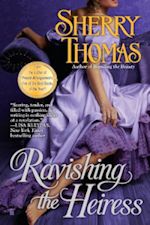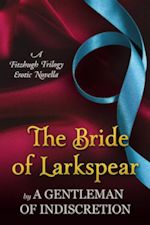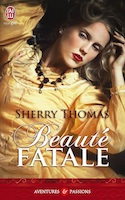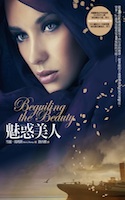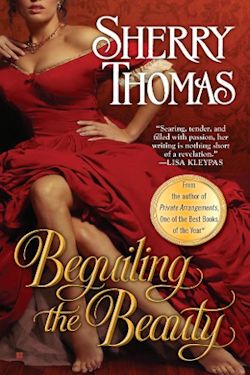Berkley
May 1, 2012
Mass Market Paperback
ISBN-13: 9780425246962
ISBN-10: 0425246965
Order Ebook:
Beguiling the Beauty
Read an Excerpt »
Order the Book »
Connected Books »
International Editions »
When the Duke of Lexington meets the mysterious Baroness von Seidlitz-Hardenberg aboard a transatlantic ocean liner, he is fascinated. She is exactly what he has been searching for—a beautiful woman who interests and entices him. He falls hard and fast—and soon proposes marriage.
And then she disappears without a trace…
For in reality, the "baroness" is Venetia Easterbrook—a proper young widow who had her own vengeful reasons for instigating an affair with the duke. But the plan has backfired. Venetia has fallen in love with the man she despised—and there’s no telling what might happen when she is finally unmasked…
Share:
Excerpt
Prologue
It happened one sunlit day in the summer of 1886.
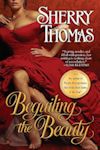
Until then, Christian de Montfort, the young Duke of Lexington, had led a charmed life.
His passion was the natural world. As a child, he was never happier than when he could watch hatchling birds peck through their delicate eggshells, or spend hours observing the turtles and the water striders that populated the family trout stream. He kept caterpillars in terrariums to discover the outcomes of their metamorphoses—brilliant butterflies or humble moths, both thrilling him equally. Come summer, when he was taken to the seashore, he immersed himself in the tide pools and understood instinctively that he was witnessing a fierce struggle for survival, without losing his sense of wonder at the beauty and intricacy of life.
After he learned to ride, he disappeared regularly into the countryside surrounding his imposing home. Algernon House, the Lexington seat, occupied a corner of the Peak District. Upon the faces of its chert and limestone escarpments, Christian, a groom in tow, hunted for fossils of gastropods and mollusks.
He did run into opposition from time to time. His father, for one, did not approve of his scientific interests. But Christian was born with an innate assurance that took most men decades to develop, if at all. When the old duke thundered over his inelegant use of time, Christian coolly demanded whether he ought to practice his father's favorite occupation at the same age: chasing maids around the manor.
As if such nerve and aplomb weren't enough, he was also tall, well built, and classically handsome. He sailed through life with the power and imperviousness of an ironclad, sure of his bearing, convinced of his destination.
His first glimpse of Venetia Fitzhugh Townsend only further fueled that sense of certainty.
The annual Eton and Harrow cricket match, a highlight of the London Season, had just paused for the players' afternoon tea. Christian left the Harrow players' pavilion to speak to his stepmother—his former stepmother, as a matter of fact, as she had recently returned from her honeymoon with her new husband.
Christian's father, the late duke, had been a disappointment, as self-important as he'd been frivolous. He had, however, been fortunate in his choice of wives. Christian's mother, who'd died too young for him to remember, was generally praised as saintly. His stepmother, who came into his life not long thereafter, had proved a great friend and a staunch ally.
He'd seen the dowager duchess earlier, in the middle of the match. But now she no longer stood in the same spot. Scanning the far edge of the field, the sight of a young woman momentarily halted his gaze.
She was casually perched on the back of an open phaeton, yawning behind her fan. Her posture was slouchy, as if she'd secretly rid herself of the whalebone undergarments that bludgeoned other ladies to sit as stiff as effigies. But what made her stand out from the crowd was her hat—a coronet of apricot-colored feathers that reminded him of the sea anemones that had fascinated him in childhood.
She snapped closed her fan and he forgot all about sea anemones.
Her face—he lost his breath. He'd never encountered beauty of such magnitude and intensity. It was not allure, but grace, like the sight of land to a shipwrecked man. And he, who hadn't been on a capsized vessel since he was six—and that had only been an overturned canoe—suddenly felt as if he'd been adrift in the open ocean his entire life.
Someone spoke to him. He couldn't make out a single word.
There was something elemental to her beauty, like a mile-high thunderhead, a gathering avalanche, or a Bengal tiger prowling the darkness of the jungle. A phenomenon of inherent danger and overwhelming perfection.
He felt a sharp, sweet ache in his chest: His life would never again be complete without her. But he felt no fear, only excitement, wonder, and desire.
"Who is that?" he asked no one in particular.
"That's Mrs. Townsend," answered no one in particular.
"She is a bit young to be a widow," he said.
The arrogance of that statement would amaze him in subsequent years—that he would hear her called a missus and immediately assume her husband to be dead. That he took it for granted nothing could possibly stand in the way of his will.
"She isn't a widow," he was informed. "She happens to be very much married."

He hadn't noticed anyone accompanying her. She appeared to him as if on a stage, alone and flooded by limelight. But now he saw that she was surrounded by people. Her hand rested casually on a man's forearm. Her face was turned toward this man. And when he spoke, she smiled.
Christian felt as if he were falling from a great height.
He'd always considered himself a breed apart. Now he was just another sod who might yearn and strive, but never achieve his heart's desire.
"You made quite a display of yourself today," said Tony.
Venetia hung on to the carriage strap. The brougham plodded through London's congested streets; there really was no need to use the strap at all. But she could not seem to unclench her fingers from the strip of leather.
"One of the Harrow players couldn't stop staring at you," continued Tony. "If someone had handed him a fork he'd have devoured you in one sitting."
She didn't respond. When Tony fell into one of his moods, there was never a point in saying anything. Clouds gathered overhead. Beneath the spreading shadows, the summer leaves turned gray—nothing escaped London's reign of soot.
"Were I less discreet I'd tell him you can't breed. You are God's elaborate ruse, Venetia. All that prettiness on the surface, quite useless where it counts."
His words were drops of acid upon her heart, burning, corroding. On the sidewalk the pedestrians opened their umbrellas, held ever at the ready. Two fat plops of rain hit the carriage window. They slid down the glass pane in long, blurred streaks.
"It is not certain I can't have children," she said. She shouldn't. She knew he was goading her. But somehow, on this subject, she rose to the bait every time.
"How many physicians does it take to convince you? Besides, my friends marry and within a year they already have heirs. It's been two years for us and you show not the least sign of increasing."
She bit the inside of her lip. The blame for their failure to procreate could just as well lie with him, but he refused to even contemplate that possibility.
"But you will be glad to know that your looks aren't entirely useless. Howard agreed to join my rail venture—and I daresay he did so to have more opportunities to seduce you," said Tony.
At last she looked at him. The harshness of his voice was reflected in his countenance, his once winsome features now hard and brittle. During their courtship she'd thought him impossibly appealing—funny, smart, and lit from within by a thirst for life. Had he truly changed so much or had she been blinded by love?
And if he despised Howard for wanting her, then why bring Howard deeper into their lives? They didn't need the rail venture. Nor another source of displeasure for him.
"Are you going to betray me?" he demanded suddenly.
"No," she said, weary almost beyond what she could bear. His contempt and dismissal of her had become a near-permanent condition of their marriage. The only thing he cared about—or so it seemed sometimes—was the matter of her fidelity.
"Good. After what you've made me become, being faithful is the least you can do for me."
"And what have I made you become?" She might not be a paragon but she had been a decent wife. She saw to his every comfort, never overspent her allowance, and gave no encouragement to men like Howard.
His voice was bitter. "Don't ask useless questions."

She turned her face back to the window. The pavement had disappeared under a horde of black umbrellas.
Even inside the carriage she felt the incipient chill. Summer would end early this year.
A short time later Christian finished his last term at Harrow and went on to read the Natural Science Tripos at Cambridge. The summer after his second year at Trinity College, he took part in a dig in Germany. On his way back to Algernon House, he stopped in London to inspect a new shipment of marine fossils at the British Museum's natural history division, fossils that would not be available for public viewing for some months.
The discussion engendered by the new fossils was most stimulating, so much so that instead of continuing on with his journey home, Christian accepted an invitation to dine with the curator and several of his colleagues. Afterward, rather than retiring immediately to his town residence, where a small staff kept the house ready for his use should he require it, he decided to while away an hour at his club. Society had departed London at the end of the Season; he could expect to be largely undisturbed.
The club was indeed quite empty. With a glass of brandy by his side, he settled in and tried to read the Times.
The days were easier. Between his course work, his estate, and his friends, Christian's hours were fully occupied. But at night, when the world quieted and he was alone with his thoughts, his mind turned all too often to the woman who'd pickpocketed his heart without so much as a glance.
He dreamed of her. Sometimes the dreams were lurid, her naked, lithe body under his, her lips whispering lecherous words of encouragement into his ears. Other times she remained resolutely out of reach, walking away while he was rooted to the ground, or coming to stand next to him just after he'd been turned into a stone statue. He would struggle and shout inside his marble confines, but she took no notice at all, as uncaring as she was lovely.
Someone entered the dark-paneled library. Christian recognized the man instantly: Anthony Townsend. Her husband.
The years since his encounter with Mrs. Townsend had been a long tutorial in the frailer aspects of humanity. Until he'd met her, he'd not known envy, misery, or despair. Nor guilt, which pulsed through his veins at the sight of Townsend.
He'd never wished the man ill—and rarely ever thought of him as anything but an immovable object. But he'd lain with the man's wife countless times in his mind. And if something were to befall Townsend, he'd be the first in line for an introduction to his widow.
Those were cause enough for Christian to drain his brandy and lay aside the paper, still crisp from its ironing. He rose to leave.
"I've seen you before," Townsend said.
After a moment of paralysis, Christian said coldly, "I do not believe we have met."
He did not quite share his ancestors' reverence for the family heritage, but he was as unapproachable as any de Montfort who ever breathed.
Townsend, however, was undaunted. "I didn't say we've met, but I know your face from somewhere. Yes, I remember now. Lord's Cricket Ground, two years ago. You were in a Harrow striped cap, gawking at my wife."
Christian's reflection in a window, a stark etching of light against the dimness of the street beyond, showed a man stunned into stillness, as if he'd stared directly into Medusa's face.
"I can't remember what my maids look like, but I remember the faces of all the men who salivate after my wife." Townsend's tone was strangely listless, as if he was beyond caring.
Christian's face burned, but he remained silent: No matter how vulgar it was to discuss one's wife in this manner—and berate those who coveted her—Townsend was within his rights.
"You remind me of someone," Townsend went on. "Are you related to the late Duke of Lexington?"
If Christian admitted his identity, would Townsend blacken his name before the missus? He watched his lips move in the window. "The late duke was my father."

"Yes, of course. You'd be Lexington, then. She'd be thrilled to know that someone with your exalted stature considers her a prize." Townsend chortled, a dry, humorless sound. "You may yet have your wish, Your Grace. But think twice. Or you may end up like me."
This time Christian could not help his scorn. "Speaking to strangers about my wife, you mean? I don't think so."
"I didn't think I'd be the sort, either," Townsend shrugged. "Forgive me, sir, for detaining you with my unmanly bleating."
He bowed. Christian returned a curt nod.
It was not until the next day that he wondered what Townsend had meant by "you may yet have your wish."
Townsend's obituary was in the paper within the week. Shocked, Christian made inquiries and learned that Townsend had been on the verge of bankruptcy. Moreover, he owed massive amounts to jewelers both in London and on the Continent. Had he been driven to accumulate those debts to keep his wife happy, so that her gaze would not stray to overeager admirers ready to step in with lavish gifts for her favors?
A year and a day after his death, Mrs. Townsend married again—a scandously early remarriage when the regulation mourning period was two years. Her new husband, a Mr. Easterbrook, was a wealthy man thirty years her senior. Soon came rumors of a rampant affair she conducted right under Mr. Easterbrook's nose, with one of his best friends, no less.
Evidently Christian's beloved was a shallow, greedy, selfish woman who injured and diminished those around her.
He forced himself to accept the truth.
It was not terribly difficult to avoid her. He did not move in the same circles as she, did not attend the London Season, and did not follow the fashionable calendar of events. Therefore he should not have run into her coming out of the Waterhouse Building on Cromwell Road, which housed the British Museum's natural history collections.
Almost five years had elapsed since he last saw her. The passage of time had only enhanced her beauty. She was more radiant, more magnetic, and more dangerous than ever.
A wildfire raged in his heart. It didn't matter what kind of woman she was; it only mattered that she become his.
He turned and walked away.
Chapter 1
Cambridge, Massachusetts
1896
The ichthyosaur skeleton at Harvard's Museum of Comparative Zoology was incomplete. But the fish lizard was one of the first to be found on American soil, in the state of Wyoming, and the American university was understandably eager to put it on exhibit.
Venetia Fitzhugh Townsend Easterbrook stepped closer to look at its tiny teeth, resembling the blade of a serrated bread knife, which indicated a diet of soft-bodied marine organism. Squid, perhaps, which had been abundant in the Triassic seas. She examined the minuscule bones of its flappers, fitted together like rows of kernels on the cob. She counted its many rib bones, long and thin like the teeth of a curved comb.
Now that this semblance of scientific scrutiny had been performed, she allowed herself to step back and take in the creature's length, twelve feet from end to end, even with much of its tail missing. She would not lie. It was always the size of these prehistoric beasts that most enthralled her.
"I told you she'd be here," said a familiar voice that belonged to Venetia's younger sister, Helena.
"And right you are," said Millie, the wife of their brother, Fitz.
Venetia turned around. Helena stood five feet eleven inches in her stockings. As if that weren't attention-grabbing enough, she also had red hair, the most magnificent head of it since Good Queen Bess, and malachite green eyes. Millie, at five feet three inches, with brown hair and brown eyes, disappeared easily into a crowd—though that was a mistake on the part of the crowd, as Millie was delicately pretty and much more interesting than she let on.

Venetia smiled. "Did you find interviewing the parents fruitful, my dears?"
"Somewhat," answered Helena.
The upcoming graduating class of Radcliffe, a women's college affiliated with Harvard University, would be the first to have the Harvard president's signature on their diplomas—a privilege roundly denied their English counterparts at Lady Margaret Hall and Girton. Helena was on hand to write about the young ladies of this historic batch for the Queen magazine. Venetia and Millie had come along as her chaperones.
On the surface, Helena, an accomplished young woman who had studied at Lady Margaret Hall and currently owned a small but thriving publishing firm, seemed the perfect author for such an article. In reality, she had vehemently resisted the assignment.
But her family had evidence that Helena, an unmarried woman, was conducting a potentially ruinous affair. This presented quite a quandary. Helena, at twenty-seven, had not only come of age long ago, but had also come into her inheritance—in other words, too old and too financially independent to be coerced into more decorous conduct.
Venetia, Fitz, and Millie had agonized over what to do to protect this beloved sister. In the end, they'd decided to remove Helena from the source of temptation without ever mentioning their reasons, in the hope that she'd come to her senses when she'd had some time to reflect upon her choices.
Venetia had all but bribed the editor of the Queen to offer the American assignment to Helena, then proceeded to wear down Helena's opposition to leaving England. They'd arrived in the Commonwealth of Massachusetts at the beginning of the spring term. Since then, Venetia and Millie had kept Helena busy with round after round of interviews, class visits, and curriculum studies.
But they wouldn't be able to keep Helena on this side of the Atlantic for much longer. Instead of forgetting, absence seemed to have made Helena's heart yearn ever more strenuously for the one she'd left behind.
As expected, Helena began to mount another protest. "Millie tells me you've even more interviews arranged. Surely I've collected more than enough material for an article. Any more and I'll be looking at a whole book on the subject."
Venetia and Millie exchanged a glance.
"It may not be a bad idea to have enough material for a monograph. You can be your own publisher," said Millie, in that quiet, gentle way of hers.
"True, but as outstanding as I find the ladies of the Radcliffe College, I do not intend to devote much more of my life to them," answered Helena, an edge to her voice.
Twenty-seven was a difficult age for an unmarried woman. Proposals became scarce, the London Season less a thrill than one long drudgery. Spinsterhood breathed down her neck, yet in spite of it, she must still be accompanied everywhere by either a servant or a chaperone.
Was that why Helena, whom Venetia had thought the most clear-eyed of them all, had rebelled and decided she no longer wished to be sensible? Venetia had yet to ask that question. None of them had. What they all wanted was to pretend that this misstep on Helena's part never happened. To acknowledge it was to acknowledge that Helena was careening toward ruin—and none of them could put a brake to the runaway carriage that was her affair.
Venetia linked arms with Helena. It was better for her to be kept away from England for as long as possible, but they must finesse the point, rather than force it.
"If you are sure you have enough material, then I'll write the rest of the parents we have contacted for interviews and tell them that their participation will no longer be required," she said, as they pushed open the doors of the museum.
A cold gust greeted them. Helena pulled her cloak tighter, looking at once relieved and suspicious. "I'm sure I have enough material."
"Then I will write those letters as soon as we've had our tea. To tell you the truth, I've been feeling a little restless myself. Now that you are finished with your work, we can take the opportunity to do some sightseeing."
"In this weather?" Helena said incredulously.
Spring in New England was gray and harsh. The wind blew like needles against Venetia's cheeks. The redbrick buildings all about them looked as dour and severe as the university's Puritan founders. "Surely you are not going to let a little chill dissuade you. We won't be coming back to America anytime soon. We should see as much of the continent as we can before we leave."

"But my firm—I can't keep neglecting it."
"You are not. You've kept fully abreast of all the developments." Venetia had seen how many letters Helena received from her publishing firm. "In any case, we are not keeping you away indefinitely. You know we must return you to London for the Season."
A huge blast of cold air almost made away with her hat. A man putting up handbills on the sidewalk had trouble holding on to his stack. One escaped his grasp and flew toward Venetia. She barely caught it before it pasted onto her face.
"But—" Helena began again.
"Oh come, Helena," said Venetia, her tone firm. "Are we to think you do not enjoy our company?"
Helena hesitated. Nothing had been said in the open, and perhaps nothing ever would be, but she had to suspect the reason for their precipitous departure from England. And she had to feel at least a little guilty for roundly abusing the trust her family had accorded her.
"Oh all right," she grumbled.
Millie, on Venetia's other side, mouthed, Well done. "And what does the handbill say?"
Venetia had entirely forgotten the piece of paper she'd caught. She tried to open it to its full dimensions but the wind kept flapping it back and forth—then ripped it from her hand altogether, leaving only a corner that said American Society of Nat.
"Is this the same one?" Millie pointed at a lamppost they'd just passed.
The handbill, glued to the lamppost, read,
American Society of Naturalists and Boston Society of Natural History jointly present
Lamarck and Darwin: Who was right?
His Grace the Duke of Lexington
Thursday, March 26, 3 pm
Sanders Theatre, Harvard University
Open to the Public
"My goodness, it's Lexington." Venetia gripped Millie's arm. "He's going to speak here next Thursday."
English peerage had suffered from a collective decline in prosperity, brought on by plunging agricultural income. Everywhere one turned, another lordship was brought to his knees by leaking roofs and blocked flues. Venetia's brother Fitz, for instance, had had to marry for money at nineteen when he had unexpectedly inherited a crumbling earldom.
The Duke of Lexington, however, had no such troubles. He benefitted handsomely from owning nearly half of the best tracts in London, given to the family by the crown when much of the land had been mere grazing grounds.
He was rarely seen in Society—the joke often went that if a young lady wanted a chance at his hand, she had to have a map in one hand and a shovel in the other. He could afford to be elusive: He had no need to jostle before the heiresses du jour, hoping his lordliness would harpoon him a whale of a fortune. Instead, he traveled to remote places, excavated fossil sites, and published articles in scientific journals.
Which was too bad. In fact, when Venetia and Millie commiserated between themselves over yet another failed Season for Helena, they invariably dragged Lexington into the conversation.
She said Belfort wasn't serious enough.
I'll bet Lexington is made of solemnity and high-mindedness.
She thought Linwood smirked too much.
A quid says Lexington never experienced a lecherous thought in his life.
Widmore is too much of a fuddy-duddy. Helena is convinced he'd complain about her endeavors.
Lexington is modern and eccentric—a man who digs fossils wouldn't object to a woman who publishes books.
They were not quite serious. Lexington in reality was probably arrogant and awkward, as reclusive eccentrics often were. But as long as he remained beyond introduction, they could look to him as a faint beam of hope in their increasingly demoralized endeavor.
That it had been so difficult to find Helena a husband mystified everyone. Helena was lovely, intelligent, and personable. She'd never struck Venetia as unreasonable or particularly hard to please. And yet since her first Season, she'd dismissed perfectly likable, eligible gentlemen out of hand as if they were a passel of murdering outlaws who also defecated on the lawn.
"You've always wanted to meet Lexington, haven't you, Venetia?" asked Millie.
Interesting how Millie, with her quiet, trustworthy demeanor, made the most convincing liar of them all. Venetia took her cue. "He likes fossils. That's quite enough to endear a man to me."

They were cutting across the grounds of the law school. The bare trees shivered in the wind. The lawns were invisible beneath the previous day's blanket of snow. The main lecture hall, rotund and Romanesque, had probably been a revolt against the rest of the university's severely rectangular architectural uniformity.
A group of students coming toward them slowed to a halt, gaping at Venetia. She nodded absently in their direction.
"So you plan to attend the lecture?" asked Helena, looking over the handbill. "It's more than a week away."
"True, but he has been impossible to meet at home. Do you know, I hear he has his own private natural history museum at Algernon House? I should be like a cat in cream, were I the mistress of that manor."
Helena frowned slightly. "I've never heard you mention a particular interest in him."
Because she had none. But what kind of a sister would she be if she didn't make sure that the most eligible—and possibly the most suitable—bachelor in all of England was introduced to Helena? "Well, he is a good prospect. It would be a shame to not meet him when I can. And while we wait for him, we can begin our sightseeing. There are some lovely islands off Cape Cod, I hear. Connecticut is said to be very pretty, and Montreal is just a quick rail journey away."
"How exciting," seconded Millie.
"A little rest and relaxation before the Season begins in earnest," said Venetia.
Helena pressed her lips together. "The duke had better be worth the trouble."
"A man rich in both pound sterling and fossils?" Venetia pretended to fan herself. "He shall be worth every trouble. You'll see."
Copyright © 2012 by Sherry Thomas. Excerpted by permission of Berkley Books, a division of Penguin Group (USA), Inc. All rights reserved. No part of this excerpt may be reproduced or reprinted without permission in writing from the publisher.
Connected Books
The Fitzhugh Trilogy







